Counteracting staff turnover. Why is employee well-being a necessity in business?
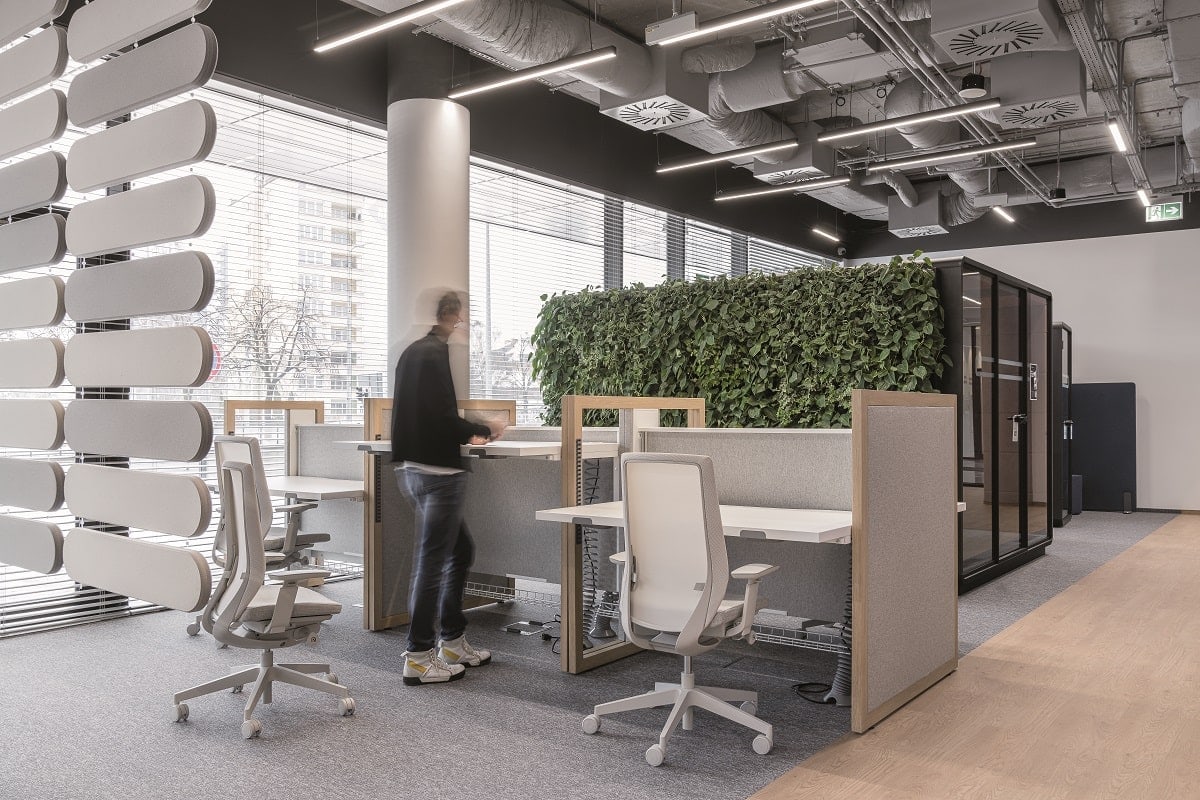
The generations of workers now entering the market, unlike previous generations, are not attached to one job. For this reason, one of the key challenges that many companies face is staff turnover. High staff turnover often leads to increased recruitment and training costs, and the loss of staff with valuable experience and expertise. Therefore, more and more organisations are beginning to appreciate the importance of employee well-being and are treating concern for staff happiness as an addition to their business strategy. Creating a working environment that promotes the physical and mental health of employees can bring enormous benefits. Read the article and find out how well-being in business can counteract high staff turnover along with the benefits it brings at various levels of the organisation.
When should staff turnover be a concern?
Employee turnover is a natural process in any business, but when it starts to increase in scale, this should be a signal for management to reflect. If staff are replaced too often, this may suggest problems with the organisational culture, working conditions or even management. A high rate of employee turnover leads to anxiety among the remaining members of the team, generates costs related to the continuous process of recruiting and onboarding new people and has a negative impact on the company’s efficiency and productivity. Therefore, managers should approach this phenomenon with due attention and analyse possible causes to allow for the introduction of appropriate solutions.
Employee well-being – the key to retention
Employee well-being is not just a perfect slogan for a corporate brochure, but a key factor in the success of a company. The employer’s understanding that behind every job is a human being with his or her emotions, expectations and aspirations becomes the foundation for creating an environment conducive to employee engagement and satisfaction. Nurturing the well-being of employees, whether through suitable working conditions, personal development or a good working atmosphere, not only attracts talent, but above all retains it for the long run. Employees who feel valued, understood and fulfilled are more likely to contribute to the long-term success of the company, which is key to corporate sustainability.
Employee well-being in the office – what is it?
When employees are healthy and happy they perform at their best! Well-being is a concept that involves creating a work environment that supports the physical, mental and emotional health of the people employed there. This involves ergonomic workspaces, access to natural light and spaces for relaxation and even naps or games to encourage movement during the eight-hour working day and influence people’s levels of satisfaction and well-being.
According to the expert
Well-being in the office is a holistic approach to employee health and happiness that extends well beyond traditional health benefits. It is a concept that encompasses all aspects of the employee experience – from physical and mental health to work-life balance and a sense of fulfilment at work. Concern for employee well-being can involve a range of activities, from creating workspaces that encourage concentration and creativity, to mental health support programmes, promoting healthy lifestyles and encouraging regular rest and relaxation. This is why well-being in the office is so important and is increasingly becoming a key element of the human resources management strategy in modern companies
– says Eliza Donek, Product Manager at Mikomax.
Well-being – a fad or part of an organisation’s identity?
Without a doubt, well-being is becoming an integral part of organisational culture. Companies are recognising the benefits (including increased productivity and employee engagement) of solutions used in the organisation to support employee well-being. Well-being is definitely more than a temporary trend – it is an important part of shaping an organisation’s identity and culture.
In today’s dynamic business environment, where high levels of stress and job burnout are real issues, companies that treat the mental and physical health of their employees as key elements of their business strategy gain a competitive advantage. Well-being is not only an element of employee care, but also a powerful tool in building loyalty and commitment, and decreasing staff turnover. Organisations that emphasise well-being create a culture based on care and respect, resulting in higher levels of employee satisfaction.
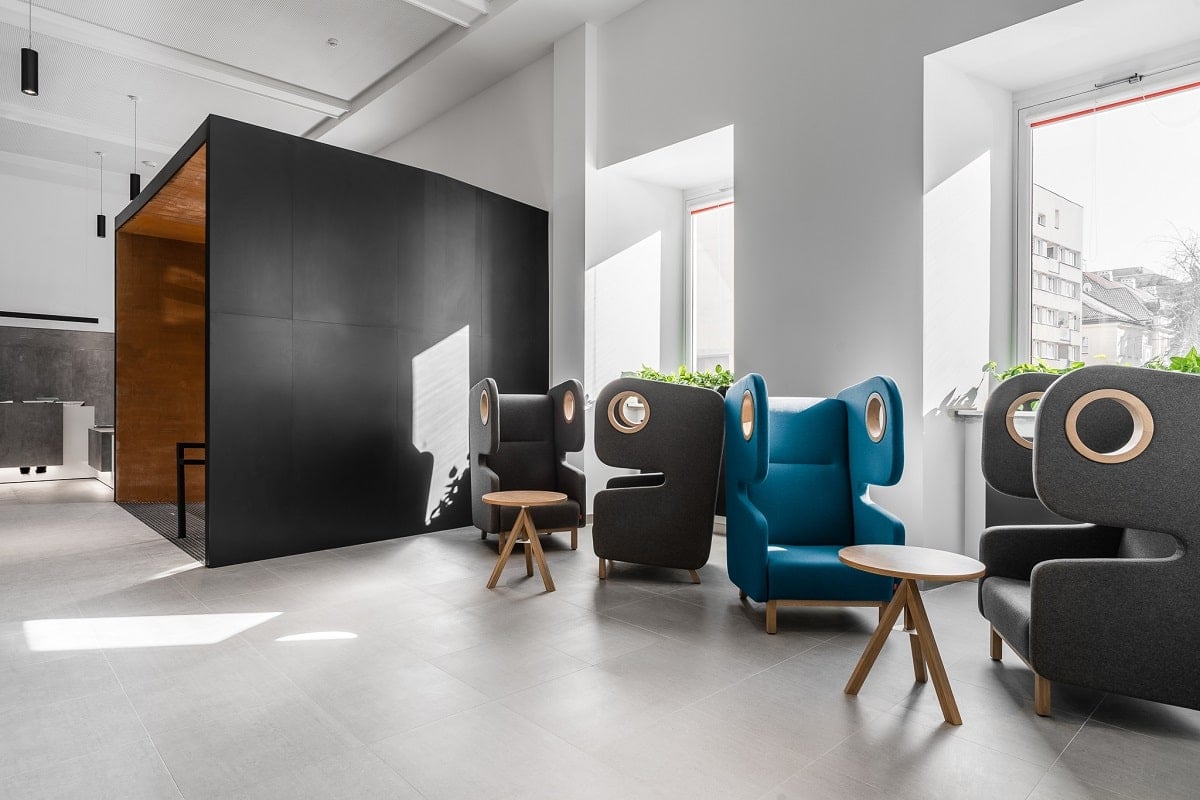
Treat well-being as an investment
It is worth being aware that investing in the health of employees and their sense of satisfaction and fulfillment is a business necessity. Organisations that want to succeed and retain the best talent in the market should care about well-being. Healthy, happy employees are more productive, creative and engaged, and this translates into higher quality work, better customer relations and, ultimately, greater company profitability.
Why should you care about employee well-being?
Employee well-being is not just a trendy corporate phrase, but a key differentiator for resilient companies. Many employers, while understanding its importance to the organisation, are reluctant to implement real change. Meanwhile, how well people feel in the workplace has a direct impact on their effectiveness, creativity and loyalty to the company. An important benefit of introducing the well-being concept is a significantly lower staff turnover rate. Thus, companies can reduce expenditure on recruitment, training of new people and disorganisation of individual teams. Well-being within a company is an investment that brings tangible benefits for both employees and the company as a whole.
Higher employee efficiency
When employees feel healthy, happy and motivated, they definitely perform their duties better. A healthy work-life balance, wellness programmes, soft skills training or psychological support all contribute to increased work efficiency, resulting in better productivity and company revenue.
Less absenteeism
Concern for employee well-being is also key to reducing absenteeism. A well-designed office and mental health support help reduce stress, which can lead to less sick leave and eliminate burnout.
Positive company image in the market
In an age of constant access to information about the company, taking care of employee well-being is an integral part of building a positive corporate image in the market. Organisations that invest in staff well-being are seen as attractive places to work, which attracts not only customers but also people with high levels of proficiency.
Reduce turnover and retain talents within the organisation
Investing in employee well-being is key to retaining talent within an organisation. Employees who feel that their welfare comes first are more loyal to the company and less likely to look for work elsewhere. This not only reduces the costs associated with recruiting and training new employees, but also helps to keep people with knowledge and experience in the company.
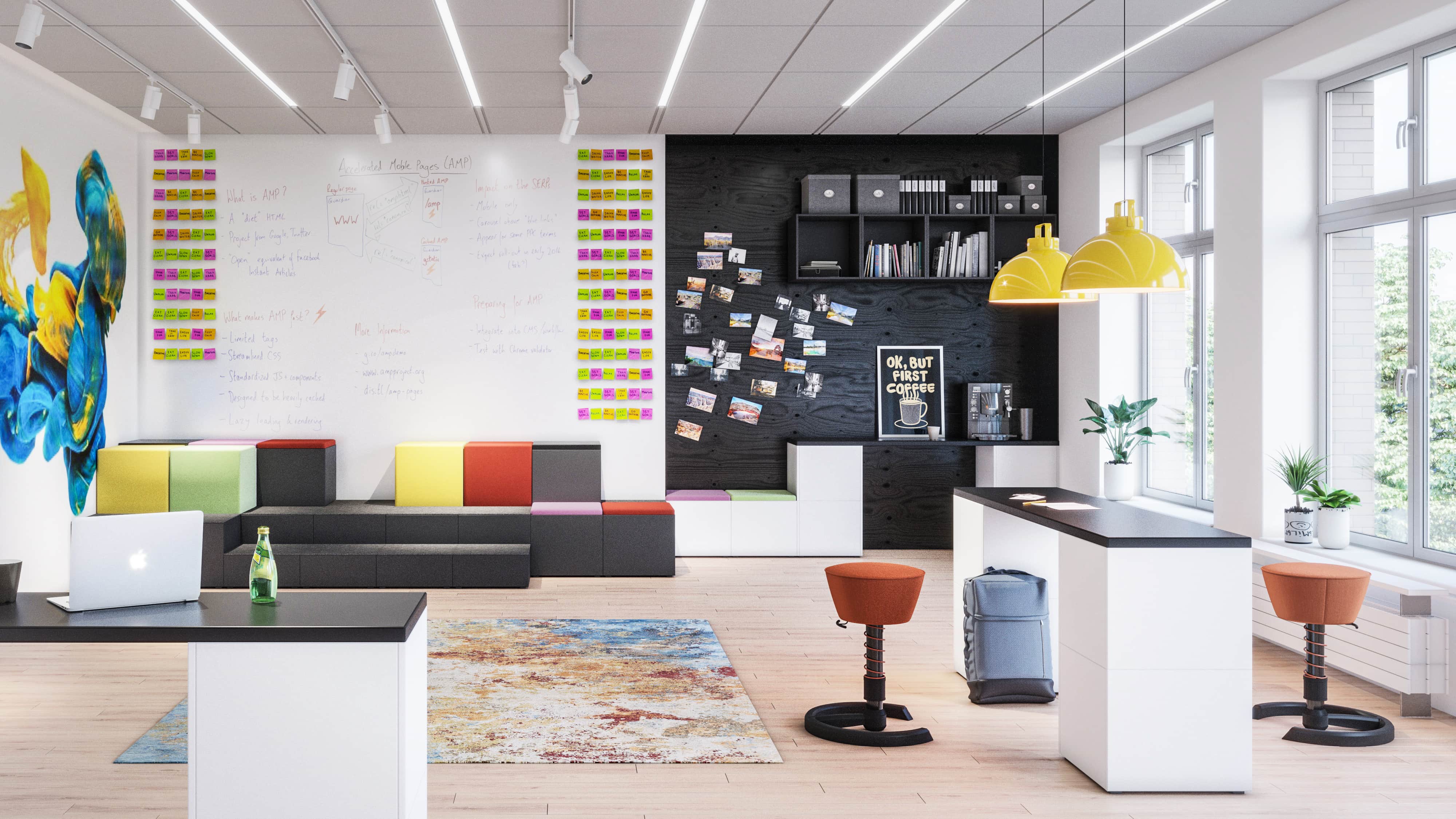
The optimum office – responding to the needs and expectations of employees
The optimum office is a place that not only provides the right conditions for daily tasks, but also meets the expectations and aspirations of employees. It nurtures physical and mental health by organising zones that foster concentration and creativity and promote physically health-appropriate behaviours. Companies that want to meet the needs of today’s workforce should not only offer the option of remote working at a chosen level, but also ensure that there are dedicated areas for tasks that require attention and concentration or collaboration between several people.
A good solution would be to install ergonomic furniture, such as adjustable Stand Up R desks, which allow you to work in both the standing and sitting positions. In an optimally designed office, attention is also paid to maintaining the work-life balance of employees, for example by providing a space for relaxation or an area for casual conversations over a cup of coffee. Depending on the culture of the organisation, an office that supports the health and well-being of employees can include elements that create a welcoming, inspiring and positive environment – from plants that improve air quality to art that stimulates creativity.
You can read more about the benefits of sit-stand desks here: STAND UP R is modular, adjustable height benching
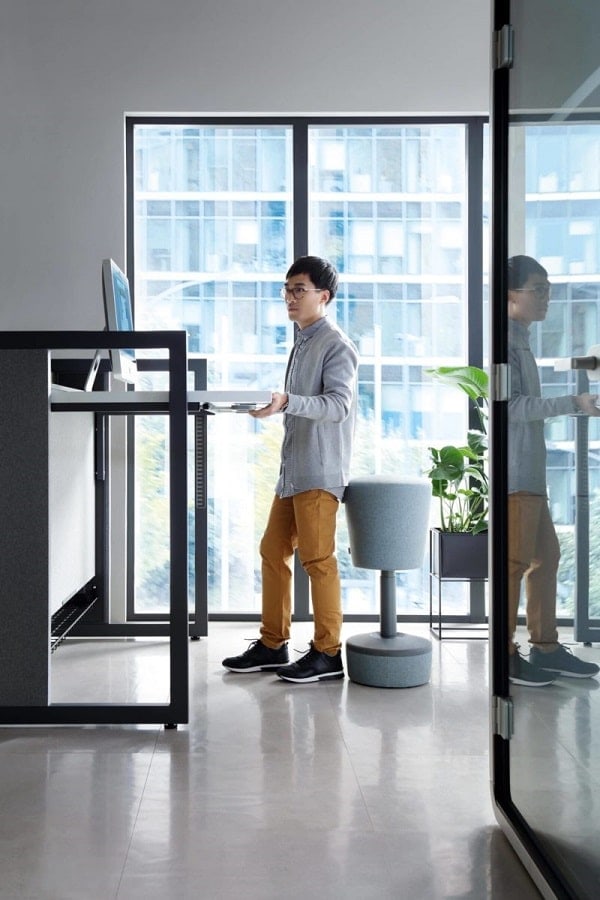
Designing flexible spaces
The design of flexible office spaces is an increasingly popular strategy that has a direct impact on employee well-being. It means creating solutions that follow the dynamics of work and adapt to the current needs of employees. It includes the creation of multifunctional areas that can be used as a place for teamwork, a space for relaxation or even as physical activity zones. It is important that zones are adapted to different working styles and take into account the needs of groups of employees. There is a variety of people working in an office, some of whom perform better in a space that is free of noise and employee chatter, while others are more productive in an open-plan space.
Modular furniture works best in flexible office spaces, allowing for quick rearrangement and changing the way of working to suit the team. The Ligo modular cube system acts like the building blocks of a well-known company, offering almost unlimited possibilities for creating spaces for individual work, group work or relaxation. Lightweight modules in a choice of 40 colours stimulate creativity and allow freedom of choice in how tasks are performed.
Relaxation zone – in search of balance
The chillout zone at work is a key element in the search for a balance between productivity and relaxation. It is a space that’s just as important as the kitchen or meeting room. It allows people to take a break from their daily tasks and to rest and recuperate after an intense intellectual effort.
A relaxation area equipped with hammocks, pouffes, swings or soft seating allows you to lower your stress levels, isolate yourself from the noise of the open space and improve your mood. It can be a quiet place for reading, a space for meditation or even a place for games and activities that promote social and team interaction. What’s more, during casual conversations or while relaxing on soft Packman sofas and armchairs, the most creative ideas or solutions to problems often emerge. The relaxation area not only creates an attractive working environment and demonstrates the company’s concern for the health and well-being of its employees, but also integrates people, often from different departments within the company.
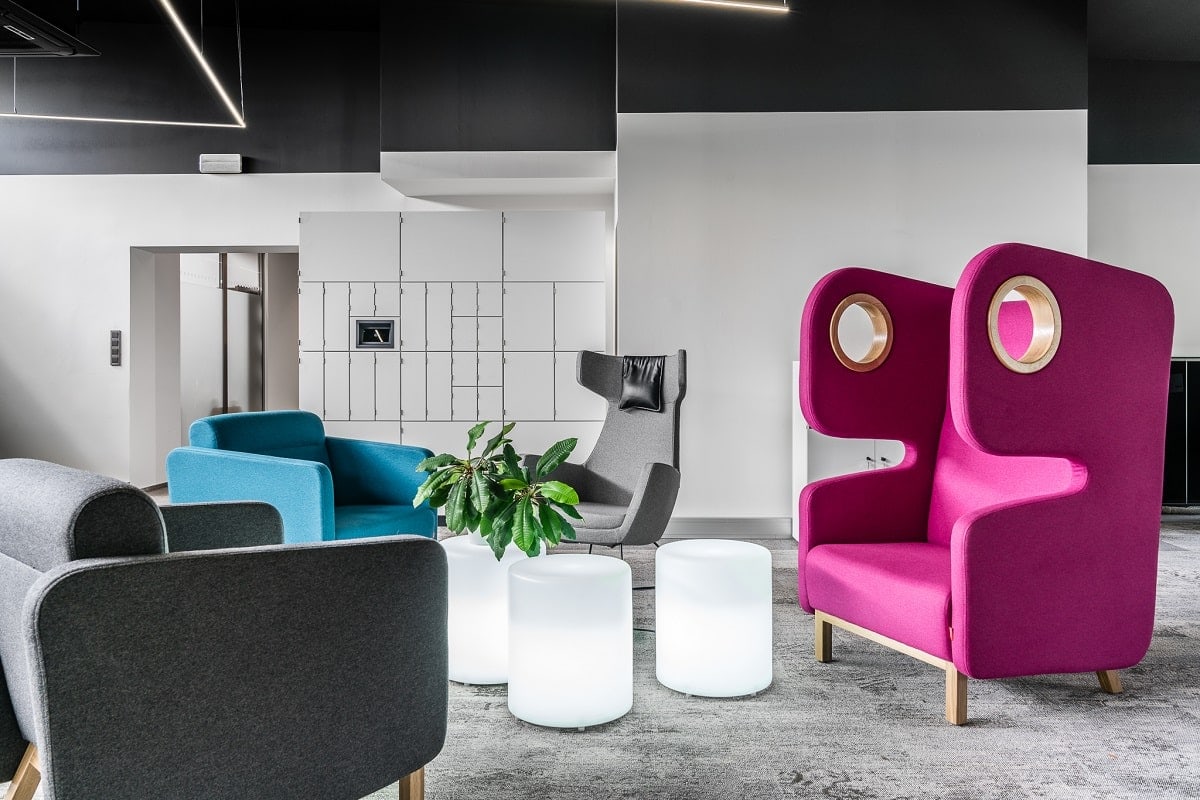
Closer to nature – plants for workplace wellness
Plants in the office are not just for improving the aesthetics of the interior. They affect air quality, reduce carbon dioxide levels and increase humidity. This translates into better employee well-being and concentration. What’s more, introducing nature into office spaces has a proven impact on reducing stress and noise levels. When well positioned, they can act similarly to office walls.
Contact with nature, even at such a simple level as the presence of plants, can bring significant benefits to the well-being of employees. This creates a friendly, healthy and inspiring environment that has a positive impact on creativity and efficiency. Caring for plants and watching them grow can also be a form of relaxation for many employees and provide a rest for their eyes from working in front of a monitor.
Employee well-being requires quiet zones
The well-being of employees not only requires active relaxation areas, but also places of peace and quiet that allow for focus and regeneration. Separating areas from the open-plan space where people can break away from the hustle and bustle or distractions to complete challenging tasks or recover from a gruelling project is vital to the work culture. A simple yet quite economical solution is to soundproof an open-plan office using free-standing acoustic walls in the shape of a tree. Separating individual workstations with them promotes concentration, improves privacy and creates an aesthetic addition that fits in with the biophilic design concept.
Alternatively, Soniq mobile acoustic walls can be used to create special zones for individual, focused work. Simply connect several panels together perpendicularly or in series and enclose a desk or relaxation areas with them. The partition material meets high sound insulation standards. Castors and sturdy legs make modifying the office layout something that’s extremely simple.

Take care of the employees and they will take care of the company
It’s a simple but smart approach to running a business. Investing in the physical and mental well-being of staff pays dividends – people who feel valued and happy are more engaged, productive and loyal to the organisation. This helps to reduce absenteeism and increase talent retention, and promotes improved overall performance. In addition, companies that care about the well-being of their employees have a better reputation in the market and thus appear attractive to potential candidates.
Improve the layout of your office space and retain top talent in your company.
Check out our range of ergonomic furniture that will contribute to the comfort and well-being of your staff >>
